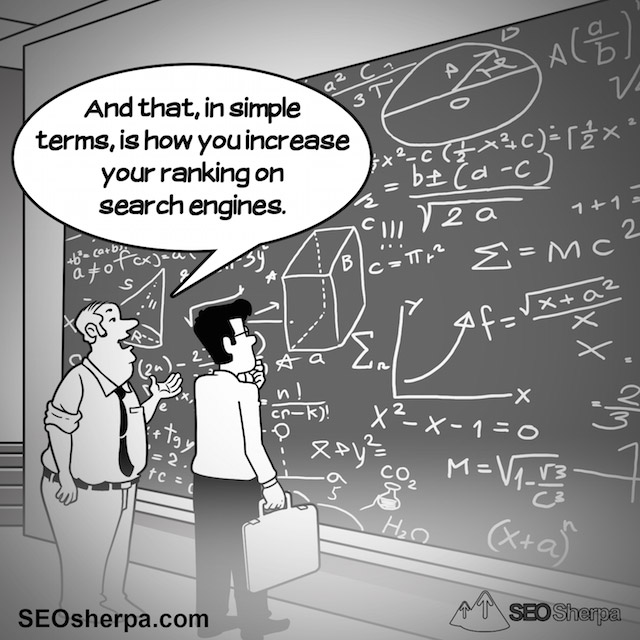


There's a Webmaxing module for this content at:
Module 3 - How Search Engines Rank WebsitesWebmaxing is a totally new way to learn SEO with videos, interactive graphics and the chance to become accredited ...
For any given query made by a user a search engine needs to answer a fundamental question:
Who would be best at answering this question?

Yes, its complex in the detail but actually fairly simple at a top level. To understand the process they go through let's consider our search for "seafood recipes".
Search engines don't consider every page on the internet that has this information. When they discover your page about seafood recipes they'll consider:
If they think your page has something to offer they will add it to their index. If not you don't even stand a whisper of a chance of being seen anywhere in their SERPs.
You can find out if you are in Google's index by searching Google itself like this: site:url.
For this page you would search site:howtoseo.link2light.com/how-search-engines-rank-pages.php.
When I am first approached by clients many are surprised to find how many of their pages are not even in Google's index!
In deciding which pages in their index should rank search engines will consider:
While that is only 5 points search engines use hundreds of signals to make decisions about them and I'll cover how to optimize for many of them on this site. But first let's look closer at these 5 points.
Does your page about seafood recipes:
... if it does then your page is very relevant to the query.
The How to SEO your website guide covers how to show search engines like Google your page or site is relevant for particular search terms.
If lots of people are mega relevant to the search term "what is the time in New York now" then the search engines know they are spoilt for choice. So now they'll want to deliver the best content and a key aspect of this is:
Search engines want users to have a great experience when using their services and websites which load slowly or are difficult to read don't give them that.
The How to SEO your website guide shows you how you can test the accessibility of your pages.
There are a lot of websites which are very relevant to the search term "what is the time in New York now", they load fast and their content is clear so where does a search engine go from here in deciding which websites should be on the first page of the SERPs?
If your website really is great at answering this question it is likely that other websites will have linked to it. Each link has the ability to pass on something known as link juice. The more respectable the website, the more link juice it can pass on.
Websites like CNN, BBC, Wikipedia, etc. have serious amounts of link juice. Auntie Jo's family blog has almost none.
Whoever links to you, even if they have buckets of link juice, how much you actually get and how effective it will be for you depends on:
From all the links to your websites and all their characteristics they will conclude how much Authority your site has.
We'll cover how to get these all important links later in the course
Carrying on the example - did other people who carried out the search "seafood recipes":
There's more detail about this on the guide page User Behaviour and SEO
Most people tell search engines, usually without even realizing it, where they are located. So a person in Washington who searches 'italian restaurant' will see a completely different set of results compared to a person in Detroit who searches 'italian restaurant'.
This is reason number one why anyone who promises you your website will be number one on Google if you use their services is to be avoided. In other words Google #1 is a myth.
Even for something as simple as 'seafood recipes' location can be important. Search engines like Google will know if users located in the San Francisco prefer certain types of seafood recipe sites to those based in Florida.
Most search engines can tell where you have been on the web in the past unless you explicitly block them.
This means the search results you see are often different from those of a person who sits next to you but uses their own computer!
As a personal example when I'm planning to cook my favorite curry I always look up 'Prawn Saag' on Google and from the results I always choose the Curry Frenzy website. This wasn't always at the top of the search results but it is now number one for my search results.
Google has learnt this is the site I am looking for after I search 'Prawn Saag' and so it tries to be helpful by placing it at the top of the list. A process known as Personalized Search.
This is reason number two why no one can promise to make your website Google #1.
Its also why many people who are just getting started on their own SEO suddenly think their work has succeeded because they notice their website rising to the top of Google all the time. It's not because they have become search engine optimization gurus, it is because they are spending a lot of time on their own sites.
A little later we'll look at how you can get round this so you can see what other people do.
This mix of signals is meant to avoid anyone being able to game the system and most importantly to give users an excellent experience with good quality results. This means:
Its exactly how I got a brand new page without any links to rank on the first page of Google withinin two weeks - have a look at this SEO example to see how I did it.